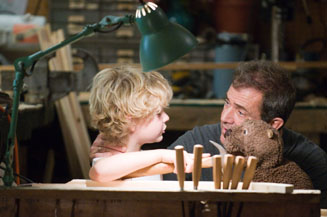|
|
Movie Review: The BeaverBy Matthew HuntleyMay 12, 2011
The film stars Mel Gibson as Walter Black, the CEO of a toy company he inherited from his father. Walter’s business has been steadily declining, as has his relationship with his wife, Meredith (Foster), his eldest son, Porter (Anton Yelchin), and his youngest, Henry (Riley Thomas Stewart). What’s interesting, and honest, about the film is that it doesn’t offer a simple explanation of why Walter has stooped into such a depressed state of mind. There’s no clear cut reason why he wants to sleep all the time or drink himself to death in a hotel. The film knows depression can’t always be rationalized. It also knows it can’t always be treated with medication and self-help books. So Walter devises his own treatment when he finds a puppet in the dumpster and starts talking to it and as it. The beaver promises Walter he’ll find a way for him to get better but that he has to stay disciplined. Now, we’re not quite sure whether Walter is aware he’s talking to/as a puppet, or if his mind has just become so jaded it’s made this decision on its own, but it’s probably better the film doesn’t provide a concrete answer (Walter is probably not too sure himself). What matters to us is whether this story, given its most peculiar premise, can be told effectively and truthfully, and Jodie Foster proves that with the right care and sensitivity, it can be. Not that there aren’t a few missteps. In an uneven subplot, Porter develops a relationship with Norah (Jennifer Lawrence), his high school’s valedictorian. Porter has built quite a reputation and income for writing other students’ papers and she’d like him to write her graduation speech.
|

|
|
|

|
Friday, April 26, 2024
© 2024 Box Office Prophets, a division of One Of Us, Inc.


